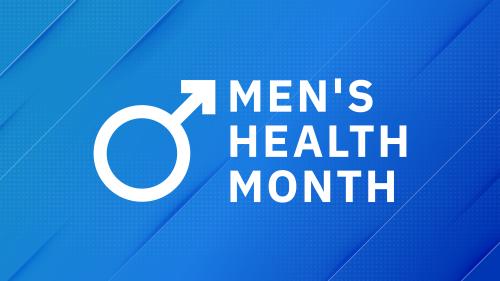June is Men's Health Month, a time dedicated to raising awareness about the unique health challenges faced by men and encouraging them to take proactive steps towards better health. This month-long campaign highlights the importance of regular health check-ups, early detection of diseases, and the adoption of healthy lifestyle choices.
Despite advancements in medical science, men often face significant health disparities and are less likely to seek medical advice or treatment when compared to women. Above all else, Men's Health Month serves as a reminder that health is not just the absence of illness, but a state of complete physical, mental, and social well-being.
The History of Men's Health Month
The origins of Men's Health Month can be traced back to the early 1990s, a period when health disparities between men and women were becoming increasingly evident. Recognizing the urgent need to address these issues, a nonprofit called the Men's Health Network (MHN) established Men's Health Month in 1994. Through this campaign, the organization aimed to create a dedicated time each year to focus on men's health issues while encouraging them to take proactive steps toward better health.
Over the years, Men's Health Month has continued to have an evolving impact. For example, the "Wear Blue" campaign encourages individuals to wear blue clothing or accessories during June to raise awareness about men's health issues. This simple gesture has helped to spark important conversations while boosting visibility for the cause.
Other campaign activities have since risen in popularity, including events such as employee health fairs, educational workshops, and free health screenings all around the world.
Men's Health Awareness: Common Issues Facing US Men
Working men in the United States face various health challenges that significantly impact their quality of life.
Cardiovascular Diseases
Cardiovascular diseases (CVD) remain the leading cause of death among men in the country. According to the American Heart Association, nearly one in three men has some form of cardiovascular disease.
Risk factors include genetics, high blood pressure, high cholesterol, smoking, and lifestyle choices (i.e. poor diet or lack of physical activity). Men are also more likely to develop heart disease at a younger age compared to women, making early detection essential.
Prostate Cancer
Prostate cancer is one of the most common cancers affecting men, with the American Cancer Society estimating that about one in nine men will be diagnosed with prostate cancer during their lifetime.
Early detection through screenings, such as the prostate-specific antigen (PSA) test, is crucial for effective treatment and improved survival rates. Regular screenings are recommended for men over 50, or earlier for those with a family history of the disease.
Mental Health Concerns
Mental health issues (particularly depression and anxiety) are prevalent among men but often go unaddressed due to societal stigma. The National Institute of Mental Health reports that men are less likely to seek help for mental health problems, which can lead to severe consequences — including an increased risk of suicide. To break the stigma, open conversations about mental health are needed now more than ever; they are the first critical step for men to receive the support they need this Men's Health Month and beyond.
Diabetes
Diabetes is a significant health concern for men, affecting their overall well-being and increasing the risk of complications such as heart disease, kidney failure, and nerve damage. The Centers for Disease Control and Prevention (CDC) states that men are more likely to develop type 2 diabetes than women.
Preventative measures — including maintaining a healthy diet, regular exercise, and monitoring blood sugar levels — are essential for both managing and preventing diabetes.
Respiratory Diseases
Respiratory diseases like chronic obstructive pulmonary disease (COPD) and lung cancer are common among working-age men (especially those with a history of smoking or exposure to occupational respiratory hazards). The American Lung Association highlights that men are more likely to be diagnosed with and die from lung cancer compared to their female counterparts.
Quitting smoking, reducing exposure to harmful substances, and regular health check-ups are key to managing respiratory diseases.
Stress & Work-Life Balance
Chronic stress can have detrimental effects on both physical and mental well-being. Unfortunately, men still often face societal pressures, which can lead to increased stress levels and neglect of their health.
Chronic stress is linked to various health issues, including heart disease, depression, and weakened immune function. As such, promoting a healthy work-life balance for wellness (i.e. mindfulness and regular physical activity) significantly improves overall health for this demographic.
Substance Abuse
Substance abuse is prevalent, as well - especially regarding alcoholism and drug use. The National Institute on Drug Abuse reports that men are more likely to use illicit drugs and develop substance use disorders compared to women.
Substance abuse can lead to severe health consequences, namely liver disease, mental health disorders, and an increased risk of accidents or injuries. This is why raising awareness about the dangers of substance abuse and providing access to treatment and support services are so crucial for addressing this issue.
Tips for Staying Healthy as a Working-Age Man

Maintaining good health is always important, especially during one's working years when the demands of career and personal life are particularly high. Here are some practical tips to keep in mind for Men's Health Month!
Regular Check-ups
Regular medical check-ups are essential for early detection and prevention of health issues. Men should schedule annual physical exams to monitor vital signs, blood pressure, cholesterol levels, and other key health indicators.
Screenings for conditions such as prostate cancer, diabetes, or cardiovascular diseases should be done as recommended based on age, family history, and specific risk factors. Regular check-ups can catch potential problems early, making them easier to treat and manage down the line.
Maintain a Balanced Diet
Men should aim to consume a variety of nutrient-dense foods, including fruits, vegetables, whole grains, lean proteins, and healthy fats. Nutritional guidelines suggest:
- Eating at least five servings of fruits and vegetables daily.
- Choosing whole grains over refined grains.
- Incorporating lean proteins such as fish, poultry, beans, and nuts.
- Limiting intake of saturated fats, trans fats, sodium, and added sugars.
Staying hydrated by drinking plenty of water and moderating alcohol consumption is also important. A balanced diet supports energy levels and immune function, all while reducing the risk of chronic diseases.
Exercise Regularly
Regular physical activity is vital for maintaining physical and mental health. The American Heart Association recommends at least 150 minutes of moderate-intensity aerobic exercise or 75 minutes of vigorous-intensity exercise per week, combined with muscle-strengthening activities on two or more days per week. Types of helpful exercises include:
- Aerobic activities: walking, running, cycling, swimming
- Strength training: weight lifting, resistance band exercises
- Flexibility exercises: yoga, stretching routines
Incorporating a mix of these activities will improve cardiovascular health, build muscle, enhance flexibility, and reduce stress on the body.
Manage Stress Effectively
Effective stress management is crucial for maintaining overall well-being. For instance, you could begin by practicing mindfulness and meditation, which can help reduce stress while improving mental clarity. Regular physical activity also serves as a natural stress reliever, promoting both physical and mental health.
Time management is another essential strategy; by prioritizing tasks and setting realistic goals, men can better manage workload stressors.
Social support plays a significant role, as well — talking to friends, family, or a mental health professional combines emotional support with practical advice. Additionally, engaging in hobbies that bring joy and relaxation helps balance stress levels much more effectively.
Avoid Smoking and Substance Abuse
Smoking is a leading cause of respiratory diseases, cardiovascular diseases, and various cancers. Quitting smoking can significantly reduce these risks and improve overall health. Similarly, avoiding excessive alcohol consumption or illicit drug use is essential for preventing liver disease, mental health disorders, and other serious health issues.
With reduced consumption, working men can improve lung function, cardiovascular health, and mental clarity, with a lowered risk of chronic diseases.
Put Men's Health First with MobMed
Working-age men are more susceptible than ever to illness and injury. That's why our team offers comprehensive health screenings, on-site clinics, and tailored wellness initiatives to provide them with the care they need to live a happier, healthier life. Be part of the movement this Men's Health Month — contact a MobMed representative today!



